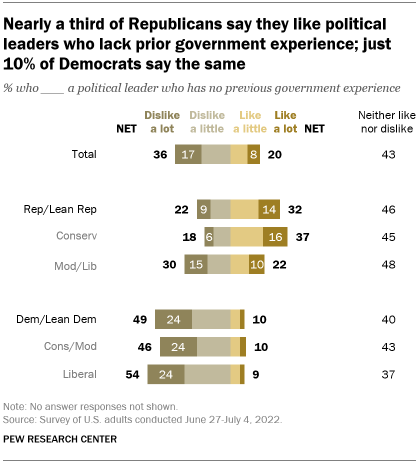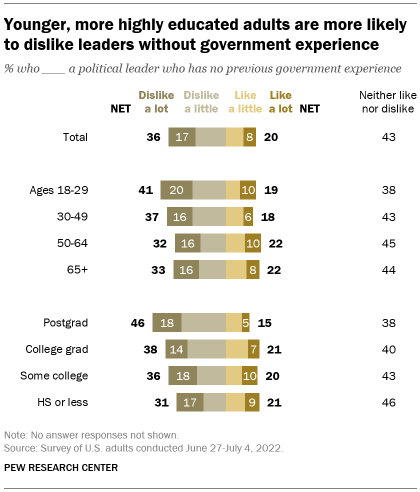Early in the 2016 presidential campaign, Republicans in the United States were more likely than Democrats to value experience and a proven record in a presidential candidate. But that changed with the rise of political newcomer Donald Trump.

Today, nearly a third of Republicans and Republican-leaning independents (32%) say they like a political leader who has no previous government experience, compared with just 10% of Democrats and Democratic leaners, according to a survey conducted in July by Pew Research Center.
Among the public overall, 20% of U.S. adults say they like leaders without prior experience in government. A larger share (36%) say they dislike such political leaders, while another 43% say they neither like nor dislike inexperienced political leaders.
Pew Research Center conducted this study to understand Americans’ views of political leaders who have no previous government experience. For this analysis, we surveyed 6,174 U.S. adults between June 27 and July 4, 2022. Everyone who took part in this survey is a member of the Center’s American Trends Panel (ATP), an online survey panel that is recruited through national, random sampling of residential addresses. This way nearly all U.S. adults have a chance of selection. The survey is weighted to be representative of the U.S. adult population by gender, race, ethnicity, partisan affiliation, education and other categories. Read more about the ATP’s methodology.
Here are the questions used for this analysis, along with responses, and its methodology.
Nearly half of Democrats (49%) hold negative views of political leaders without previous government experience, including 24% who dislike such leaders a lot. Just 10% of Democrats say they like inexperienced political leaders, while 40% neither like nor dislike them.
Republicans’ views are more divided. While 32% say they like political leaders with no prior government experience, 22% dislike them and 46% neither like nor dislike such leaders.
Conservative Republicans are more likely than moderate or liberal Republicans to favor leaders without prior government experience. Among conservative Republicans, about twice as many say they like leaders without previous government experience (37%) as say they dislike this type of leader (18%). Among moderate and liberal Republicans, a larger share say they dislike (30%) than like (22%) leaders without government experience.
Nearly identical shares of liberal Democrats (9%) and conservative or moderate Democrats (10%) say they like political leaders without prior government experience. However, liberal Democrats are 8 percentage points more likely than conservative or moderate Democrats to say they dislike this type of leader (54% vs. 46%).
Younger adults and those with higher educational attainment are more likely to have negative views of political leaders without previous government experience than older adults and those with less formal education.

Adults ages 18 to 49 are more than twice as likely to say they dislike leaders without previous experience (39%) as they are to say they like such leaders (18%). Among adults ages 50 and older, the difference is smaller: 32% say they dislike and 22% say they like leaders without prior government experience.
And while adults at all levels of educational experience are more likely to dislike than like leaders without prior government experience, those with a postgraduate degree are especially likely to say they dislike this type of leader. Nearly half of adults with a postgraduate degree (46%) say they dislike such leaders, compared with 38% of those with college degrees but no postgraduate experience. About three-in-ten adults with a high school education or less (31%) and 36% of those with some college education but no degree say the same.
Note: Here are the questions used for this analysis, along with responses, and its methodology.



